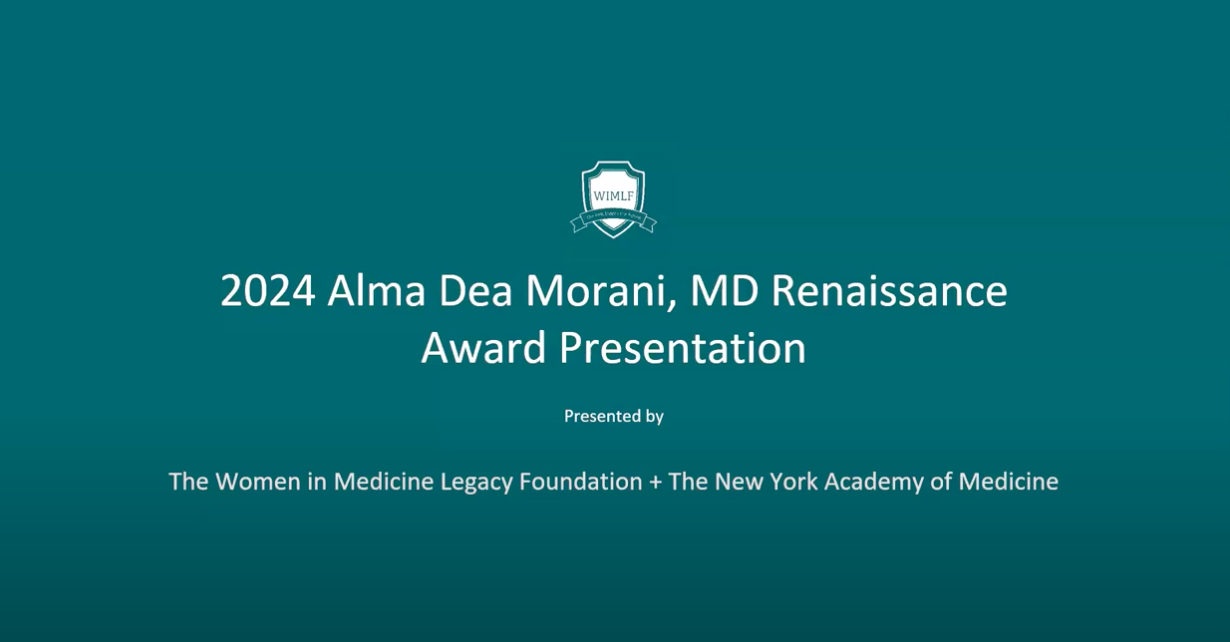Rates, Risks, and Treatment of Depression: My Scientific Journey
Women in Medicine Legacy Foundation President Danielle Laraque-Arena, MD, FAAP with 2024 Alma Dea Morani Awardee Myrna M. Weissman, PhD (right). Photo: NYAM
2024 Alma Dea Morani awardee Dr. Weissman shares insights from a groundbreaking career
Myrna M. Weissman, PhD, renowned for her groundbreaking contributions to the mental health field, is the 2024 recipient of the Alma Dea Morani, MD Renaissance Woman Award, the highest honor bestowed by the Women in Medicine Legacy Foundation.
Dr. Weissman is a Professor of Epidemiology and Psychiatry in the Vagelos College of Physicians and Surgeons and the Mailman School of Public Health at Columbia University. She also serves as Co-Director of the Division of Translational Epidemiology and Mental Health Equity at the New York State Psychiatric Institute.
Her research on understanding the rates and risks of mood and anxiety disorders using methods of epidemiology, genetics, and neuroimaging—and the application of these findings to create and test empirically based treatments and preventive intervention—has transformed her field and our understanding of mental health disorders.
Over the course of her innovative career, Dr. Weissman developed the first epidemiologic study of rates of clinically based psychiatric disorders in the United States—work that became a model and is now widely used outside of the U.S.
Dr. Weissman shared a compelling reflection on her groundbreaking career in mental health research during her remarks on October 8, 2024, highlighting the uncharted paths she navigated to transform the fields of epidemiology, psychiatry, and psychotherapy.
One central theme of Dr. Weissman's talk was the evolution of evidence-based psychotherapy, a field that she pioneered with her late husband. She recounted the early skepticism surrounding the evaluation of psychotherapy, noting that in the 1970s and 1980s many believed it was impossible to measure the efficacy of therapeutic interventions. Dr. Weissman challenged this conventional wisdom by developing standardized methods for psychotherapy trials.
Her work laid the foundation for Interpersonal Psychotherapy (IPT), an approach that has since been validated through over 160 clinical trials across 31 countries. Dr. Weissman emphasized the resilience required to persist in a field that many initially dismissed, underscoring how IPT has become a global tool for addressing depression and its social triggers.
Another key theme was the study of intergenerational transmission of depression. Dr. Weissman shared insights from her decades-long research on the impact of depression across three generations within families. Her studies revealed that children of parents with depression are at a higher risk of developing depression themselves, especially when both a parent and grandparent are affected. Her research also provided hope, however, showing that effective treatment of a depressed parent can significantly improve outcomes for their children. This finding emphasizes the importance of early intervention and comprehensive family-centered care in mental health.
Throughout her remarks, Dr. Weissman reflected on the unexpected and fulfilling journey of her career. Her presentation was a testament to the perseverance and innovation required to challenge outdated beliefs and bring about meaningful change in the field of mental health—and is an inspiration for all women in medicine.
Watch the video of her sharing her story and excerpts of her speech below.



